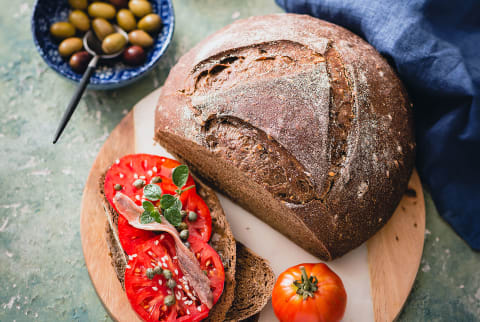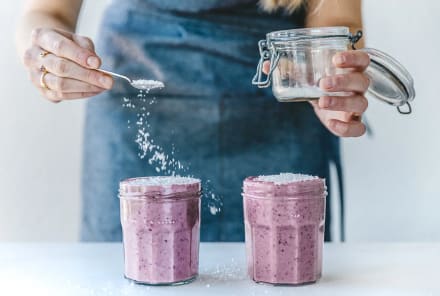Advertisement
Is Sourdough Bread Healthy? Plus, 3 Benefits Worth Noting


As a society, I think we can officially retire the anti-carb diet mentality. In fact, there's a long list of carb-rich foods that can elevate your well-being, especially when it comes to providing energy fuel and optimizing recovery.
Bread may seem like junk food thanks to years of diet culture programming, but that's surely not always the case—especially when it comes to sourdough bread.
There are plenty of unique health pros to picking sourdough over plain white bread, so we're diving into the science behind these benefits.
To come, everything you need to know about sourdough bread benefits from research and nutrition experts.
Meet the experts
Amy Myers M.D.
Amy Myers is a functional medicine practitioner, New York Times bestselling author, and the founder of Amy Myers MD, an e-commerce wellness brand.
Amanda Sauceda, R.D.
Amanda Sauceda is a registered dietitian specializing in gut health, irritable bowel syndrome, and food sensitivity.
What is sourdough?
First off, what is sourdough really? Let's start from the beginning—a sourdough starter. To make the first stage of sourdough bread, you mix flour and water together and let it ferment.
This mixture, known as the starter, is then used to make a full loaf of bread. The fermentation process gives sourdough its characteristic tangy flavor.
Sourdough bread's nutritional fats range depending on the product, but on average, a medium slice of sourdough bread1 contains the following:
- Calories: 188
- Carbs: 37 grams
- Fat: 1 gram
- Fiber: 2 grams
- Protein: 8 grams
- Riboflavin: 17% of the DV
- Selenium: 32% of the Daily Value (DV)
- Folate: 21% of the DV
- Thiamine: 21% of the DV
- Niacin: 20% of the DV
- Manganese: 15% of the DV
- Iron: 13% of the DV
- Copper: 10% of the DV
Sourdough has a similar nutrient profile to whole wheat bread, although the latter typically contains more fiber, notes registered dietitian and gut health expert Amanda Sauceda, R.D.
However, you can get whole wheat sourdough (in which you swap the typical bread flour for whole wheat flour), which increases the fiber content.
Even beyond whole wheat, there's plenty of variety in sourdough. You can use a sourdough starter to make rye sourdough, French sourdough, or the most famous, San Francisco sourdough, which is made using a unique form of yeast native to the San Francisco area.
Health benefits of sourdough
Now that you know the sourdough basics, let's dive into the health benefits (and yes, there are plenty):
1. Sourdough bread supports a healthy gut
The fermentation process involved in making sourdough produces prebiotics, which are great for the gut. You can think of prebiotics as food for your gut to eat, which in turn, eases digestion and supports your gut microbiome.
That being said, sourdough bread may not be the best choice for those already experiencing gut health conditions like SIBO or candida overgrowth, says functional medicine practitioner Amy Myers, M.D.
In these cases, your gut already has an overgrowth of bacteria, so eating fermented foods can be like fueling the fire, she says.
However, gut health is very complex—and there's much to be said for personalized recommendations. So, if you are struggling with your gut health, consult your physician before going crazy with fermented foods, even sourdough.
2. Sourdough may be easier on your blood sugar
If you're focused on blood sugar balance, be it with diabetes or not, sourdough bread may be a better choice than typical white bread.
However, this is mainly anecdotal, as the research on this specific topic is quite minimal. "It's thought that sourdough can have a lower glycemic index, which means it could have less of an effect on your blood sugar, but that isn't solidly backed up in the research," Sauceda says.
Some studies point to the fermentation process as the probable cause for sourdough's impact on glucose, which is shown to be lower than bread made with baker's yeast alone2. Other research suggests it's the lactic acid content in sourdough that's responsible for the improved glucose response3.
If sourdough's unique flavor isn't for you, the next best option for blood sugar concerns would be wheat bread, she adds.
An RD's tip
3. It's easier to digest & may have more antioxidants
Additionally, sourdough bread contains lactic acid and yeast, both of which help to reduce the phytic acid content in the bread. Phytic acid is what you call an "anti-nutrient," meaning it can get in the way of your body's optimal processes—in this case, digestion. Because the phytic acid is lower in sourdough bread than other types of bread, it can be easier to digest4.
Some research suggests that sourdough bread may also have more antioxidants 4than other types of bread. This could be due to the lactic acid concentration or the low pH of sourdough bread. Either way, when it comes to antioxidants, more is generally better–so consider this a worthy plus.
Can you eat sourdough if you're gluten intolerant?
The fermentation process helps to break down gluten proteins5, which is why some people with mild gluten sensitivity may find it easier to digest.
However, as Myers notes, sourdough bread still contains gluten and should be avoided for those with more serious concerns like celiac disease.
Store-bought vs. homemade sourdough
Like many foods, a homemade sourdough loaf may bring more health benefits than one that has been highly processed. Sauceda recommends checking out your local farmers market or baking your own sourdough if you're seeking out the highest nutritional value.
This way, there are minimal preservatives, allowing the fermentation integrity to be at its best. Plus, you'll find fewer add-ins and preservatives.
However, this is a double-edged sword, as fewer preservatives means a quicker shelf life for your sourdough. To prevent food waste, consider buying smaller loaves or storing your sourdough in the refrigerator to extend its shelf life.
Editor's note
All in all, sourdough bread is a healthy choice for most people. While there are some basic cautions around gluten tolerance, this bread is generally recommended by health experts to be included in a healthy diet—a win for sourdough lovers.
FAQ
Is sourdough healthier for you than regular bread?
Sourdough bread has a few unique perks. For starters, it's often easier to digest and supports gut health thanks to the fermentation process and lactic acid content. Sourdough also contains more antioxidants than other types of bread. Finally, sourdough has a lower glycemic index and lower gluten content, making it a good choice for those with blood sugar concerns or mild gluten sensitivity.
Is it OK to eat sourdough bread every day?
"Having a couple slices of bread each day is no big deal," says Sauceda. However, if you have gluten sensitivity or blood sugar concerns, having more than one slice a day may not be the best idea. It's best to assess this on a personal basis, and ask your physician if you have any unique concerns.
What is the disadvantage of sourdough bread?
Sourdough bread comes with more advantages than disadvantages for most people. However, while sourdough does contain less gluten than many other types of breads, it is not completely gluten-free and should be avoided by those with celiac disease. Sourdough bread also contains plenty of prebiotics, which in most cases is great for gut health, except for those who already have SIBO or Candida overgrowth. In those cases, ask your doctor before loading up on the sourdough.
The takeaway
Sourdough bread has plenty of health benefits. For starters, it's often easier to digest and supports gut health thanks to the fermentation process and lactic acid content.
Sourdough also contains more antioxidants than other types of bread. Finally, sourdough has a lower glycemic index and lower gluten content, making it a good choice for those with blood sugar concerns or mild gluten sensitivity.
Craving a slice? Check out this beginner-friendly sourdough recipe.
Watch Next
Enjoy some of our favorite clips from classes
Enjoy some of our favorite clips from classes
What Is Meditation?
Mindfulness/Spirituality | Light Watkins
Box Breathing
Mindfulness/Spirituality | Gwen Dittmar
What Breathwork Can Address
Mindfulness/Spirituality | Gwen Dittmar
The 8 Limbs of Yoga - What is Asana?
Yoga | Caley Alyssa
Two Standing Postures to Open Up Tight Hips
Yoga | Caley Alyssa
How Plants Can Optimize Athletic Performance
Nutrition | Rich Roll
What to Eat Before a Workout
Nutrition | Rich Roll
How Ayurveda Helps Us Navigate Modern Life
Nutrition | Sahara Rose
Messages About Love & Relationships
Love & Relationships | Esther Perel
Love Languages
Love & Relationships | Esther Perel


















